This is Home: Sylvia Difino, an Italian in Mile End
British-Italian artist Sylvia Difino speaks about right-wing populism in Italy, prejudice in the UK post-Brexit, and trying out fasting for Ramadan to connect with her Muslim neighbours.
Sylvia Difino, 52, lives on the 13th floor of a tower block near Tower Hamlets Cemetery Park, overlooking views of London’s skyline. She emigrated to the UK from Milan in 2011, seeking a new beginning after heartbreak. Originally settling in Woodford Green in Essex, Difino moved to the East End in 2021 and hasn’t looked back since.
We meet in Difino’s flat, a sanctuary of potted herbs, paintbrushes and eclectic paintings. Several life-size, three-dimensional sculptures – part human, part tree – surround the dining table, giving the illusion that we aren’t alone as we sit down to talk over tea.
After studying at the Academy of Fine Arts of Brera in Milan, Difino abandoned art and began a career as a herbalist. But when she moved to the UK and started working as a teaching assistant with young children, she reconnected with her creative side.
Now a full-time artist, Difino is a member of the #draweachother group, a global community of creatives who draw each other’s portraits and frequently exhibit at The Victoria pub in Mile End.
Difino’s mother is from Umbria, Italy’s ‘green heart’ bordering Tuscany, and her father is from Basilicata, a region of forests and mountains in the south. She’s proudly Italian and British, and calls herself a ‘citizen of the world’.
Talking to Difino, she balances pride in her Italian heritage with an unbridled curiosity for learning about new cultures. She lives her life with the same philosophy she paints – with a radical openness to experimentation and otherness, transforming a blank canvas into something beautiful.
What are some of your earliest memories of growing up in Italy?
I grew up in the 80s, and the 80s in Milan were very different from the 80s in London. They were very shallow, in my opinion. Milan is very much a city of fashion and style, and I have always been quirky, so I never found my spot. You had to be pigeonholed into something, and I’ve never been like that. I used to wear my siblings’ clothes from the 70s, and people would look at me, and say: “Weird little girl.”
The 80s was the shallowest, high point of fashion. It was all about brands, Valentino, Armani, Moncler. Everything – from socks to hair – would have to be a reference to the fashion at the time.
Don’t get me wrong, I love Milan, it’s great, but you need to know it. You need to go with someone that is from Milan to Milan, because she’s like a beautiful lady, but she’s very minimalist. You don’t see very much. You need to go inside the courtyard to discover the beautiful liberty (the Italian variant of Art Nouveau architecture), the buildings, the balconies, and the beautiful, hidden gem restaurants.
Did religion play a role in your upbringing?
Absolutely, it was totally Roman Catholic. There was no choice. I don’t know if it’s changed. My family is Catholic, I’m not, I’m totally atheist. I’m very tolerant, but since I was little, I found it very unjust – the fact that there was no choice.
There was compulsory religion in school, and I remember fiery arguments with my teacher, who taught me how to behave. I made up my mind that I wasn’t Catholic when I was really, really young. And they would not accept it, they just thought I had some issue myself.
What recipe takes you back to your Italian childhood?
This recipe was my father’s recipe from Basilicata, the south of Italy. It’s very old and very, very simple. Pancotto – cooked bread.
It’s made with a bread called Pane di Altamura, made with durum grain – a very yellow kind of grain. It’s very famous – it’s a heritage bread, and it’s got a very hard crust, so it lasts for a long time, and you use it till the end, even if it’s super dry, you do a recipe.
This recipe is made when the bread gets hard. They boil a kind of broccoli leaf (but it’s not broccoli), cime di rapa. Towards the end, they put the bread in the water, drain it, and then fry it with extra virgin olive oil (it has to be the best quality), chilli and garlic. It’s very simple and you have to have the best ingredients.
What is politics like in Italy?
Immigration in Italy started quite late. We were the migrants, we would migrate all over the world, that’s why you find us everywhere. Migration was quite a recent thing, that’s why this new populist, racist wave grew so massively to the point that we have a fascist as a prime minister.
Also, it was a consequence of the big recession in 2006, that left people facing a reality that wasn’t there [before]. There were underprivileged and poor people, and the majority of people were not middle class – but everyone was good, and well enough not to struggle.
2006 left Italy really broke, there were families facing poverty for the first time. I remember reading [about] families committing suicide because they didn’t have any means to survive.
It’s really heartbreaking. We always had a right and left, but it’s just a response to that recession and the influx of migrants we’ve had. Because Italy, Greece and Spain are there. Fortunately, we have to take in all the people, the people come in because it’s the first country. I hear people say “we’re only a tiny island”, [but] they just don’t care what happens in the South of the world.
It’s heartbreaking, and most of the time when I go back there, I can’t even talk if I don’t want to have an argument, which is really sad.
What drew you to the UK?
David Bowie. And the chips, the best chips in the world. I’ve always had an affair with London. Since I was little I decided that I wanted to live in London, because of David Bowie, my sister and my brother loved him. I learnt English through his records.
Then I had a boyfriend when I was young and he was from London, and I came here when I was 19. He used to live here in Greenwich, an actor. I tried to find him again and I couldn’t! That was my first love, he broke my heart. I still think of him sometimes!
We had this lovely love story, then he broke my heart, and London was there in my life. So when I had to start again, 20 odd years later, I said do you know what, I’m going to England.
Yes, we have our traditions and culture and rules and regulations to respect. But we’re all women, we all laugh and joke and there’s this sense of unity when we do stuff together.
Sylvia Difino
What prejudices do Italians enounter in the UK?
When I moved to Woodford [in 2011], there were not many foreigners in the area, and they would treat me with so much respect, I was always welcome, they used to give me permission to put my bicycle inside the pub, so I could see my bike. Everyone was really kind and helpful, I felt at home.
And then it was really the day after Brexit, there was this populist wave, and I’m upset talking about that because I really believe Brexit ignited everything that is happening in the world. It gave people the permission to say: “Okay, they’ve done it in England, so we can do it over here, and over there.”
I used to work at Borough Market, doing a Saturday job, and the day after [Brexit] people were shouting at me: “Learn English!”. Or at work, being really isolated because of language barriers, “You’re too passionate”, pointing out my nationality. It’s sad.
A lot of my friends went abroad. There are two types of Italians, the ones that always complain they want to go back, and then there are other types like me, who embrace the fact of being an expat. You appreciate your nation more from far away sometimes. A lot of people left, and I’ve got friends in Vietnam, Madrid, Dubai, all over the world, because England wasn’t a welcoming place anymore for Europeans.
What does the East End mean to you?
I love it. Especially this building, it’s amazing. Every time I take the lift, I meet a new person. People are just nice and there for each other.
Two weeks ago, when Ramadan started – because of what happened in Palestine, it’s very dear to my heart – so I thought okay, I want to try and fast. I can’t go the whole way and I’m not going to pray. But I just did it for me. Then one day I met this woman and she said she was fasting, and I said I’m trying to fast myself. And she looked at me and was like, “You’re not Muslim”. And I said, well I’m just doing half a day, I’ll try.
And then at some point I heard the bell, and this woman came with food in the evening for me. And that tells you a lot about the culture. I’m not religious, but I’m learning a lot about Muslim culture through this community.
I studied in Ilford as a teaching assistant, another big Muslim community. I learnt a lot, studying with other women. We’re all women. Yes, we have our traditions and culture and rules and regulations to respect. But we’re all women, we all laugh and joke and there’s this sense of unity when we do stuff together. We are a force, a powerful force, and I love to learn about women from other cultures. I’m always embracing people coming from other places.
Do you have an object in your home that connects you to your Italian heritage?
Maybe in the kitchen. I didn’t take too much, but this [cake tin] came from my mum and dad’s kitchen in Umbria. When they retired, they bought a house in Umbria, in the countryside. They started to make their own wine and olive oil, surrounded by sunflower fields. They lived there for twenty years, and they were young again. They started a new life.
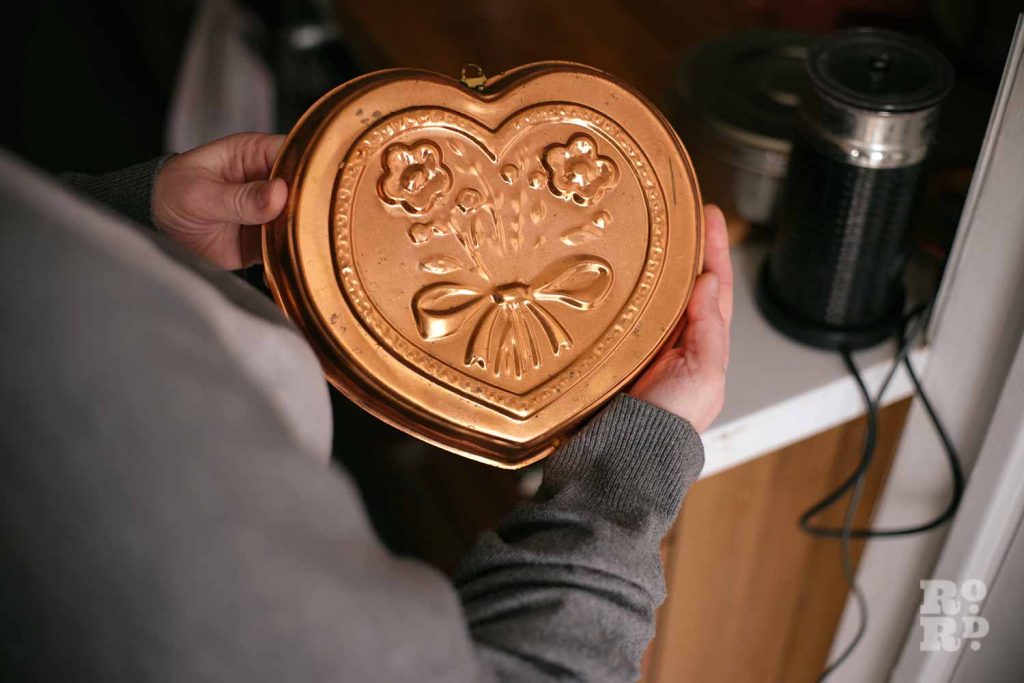
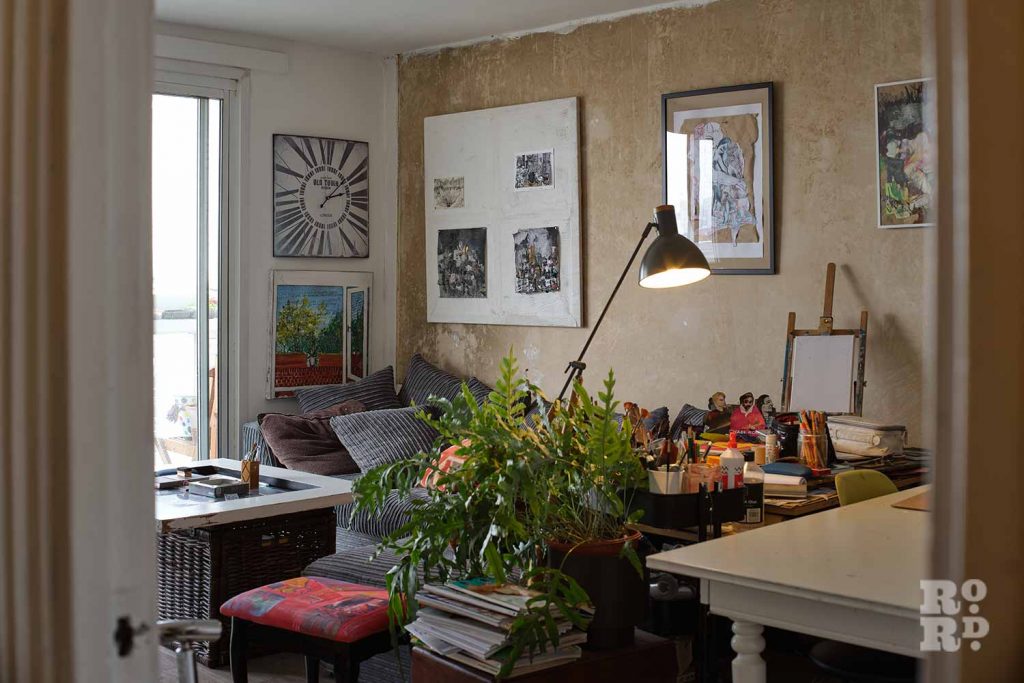
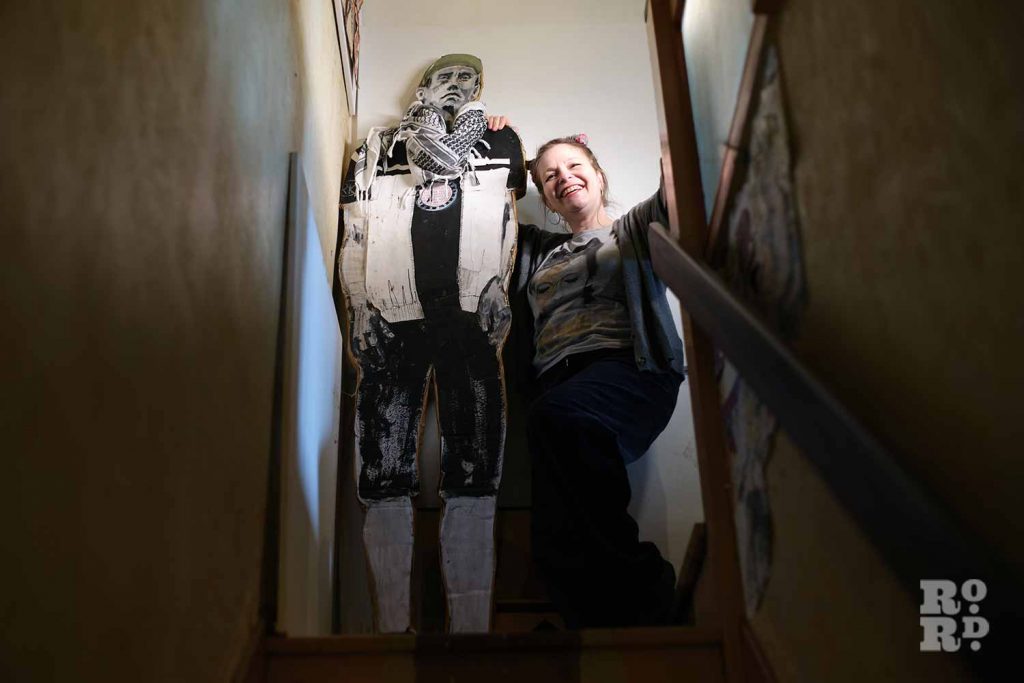
For more articles in this series, read This is Home: Jagmohan and Shinder Bhakar, Sikhs in Bow

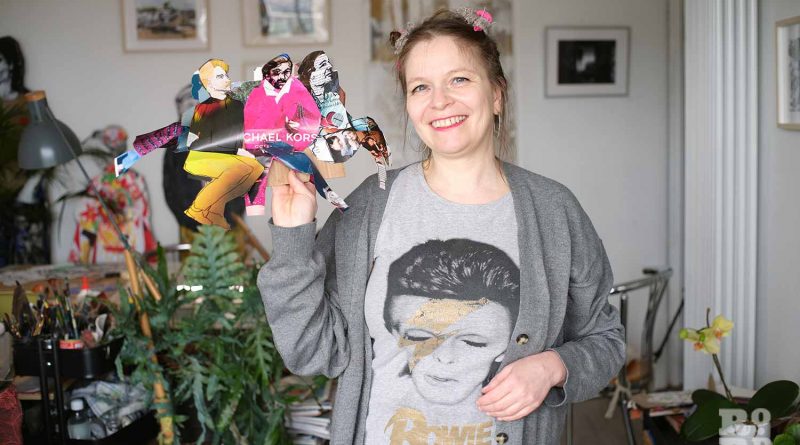

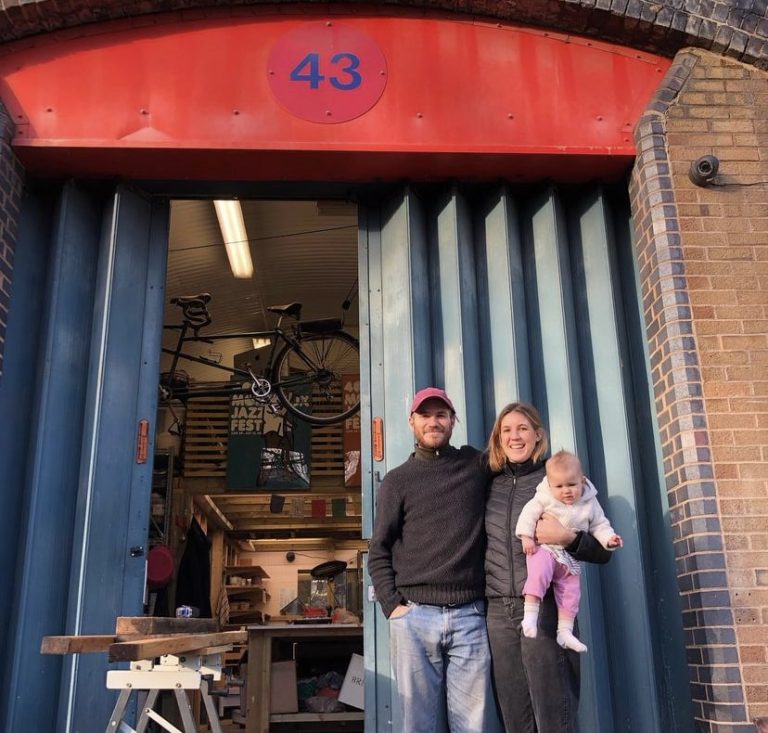
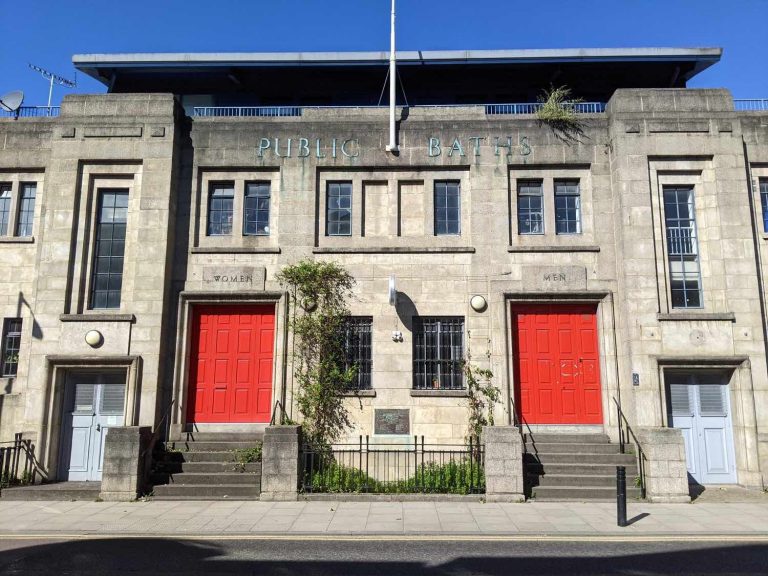
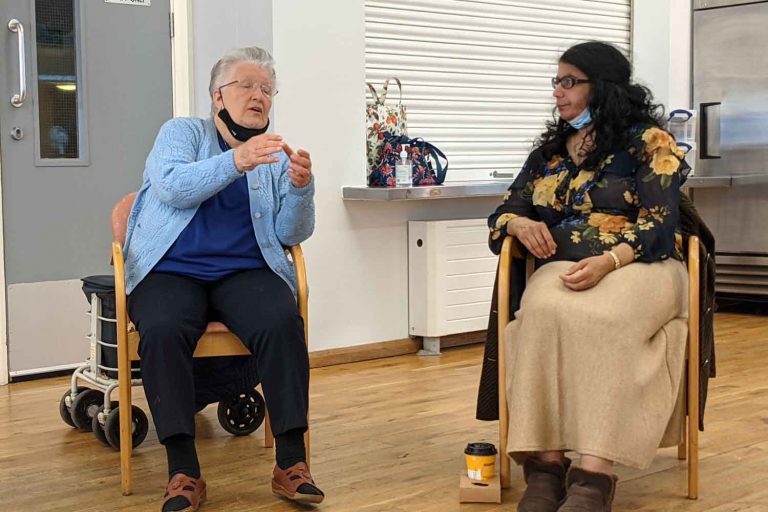


You’re such an inspiration as a Woman and as an Artist.
You’re generous, kind and empathic. Keep shining beautiful human!